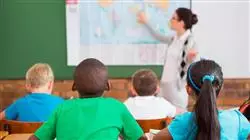University certificate
The world's largest school of languages”
Introduction to the Program
Improve your communication and mediation techniques in Spanish as a Foreign Language, thanks to this prestigious teaching course"

Any attempt at communication requires the speaker to have a complete command of his or her communicative abilities. To teach Spanish as a foreign language, it is essential to know all the skills that students must develop and their different learning stages, in order to develop different methodologies adapted to their educational needs.
This University Course will provide teachers with the necessary tools and knowledge to do their job confidently and efficiently, enabling them to help their students to understand and analyze messages effectively, and to develop non-verbal communication.
The teacher will be able to explain and resolve confusing grammar issues or questions regarding their student’s assessment process. The teacher will have access to a complete teaching methodology for vocabulary and to different techniques and didactic materials, taught by acclaimed experts in the field with extensive experience in the educational sector.
This training will enable you to develop and expand knowledge and skills related to Spanish lexical competence in teaching. At the end of the Postgraduate certificate, you will be able to detect common errors in Spanish teaching and will have acquired the necessary tools to prevent and correct them, so that you have the skills to work as a teacher of Spanish as a foreign language.
Thanks to virtual classes, support groups and forums, you will be in direct contact with the faculty, who will guide you throughout the training process"
This Postgraduate certificate in Intercultural Communicative Competence and Mediation in the Spanish as a Foreign Language Classroom offers you a University Course with a high level of teaching and technology. These are some of its most notable features:
- Latest technology in online teaching software
- Highly visual teaching system, supported by graphic and schematic contents that are easy to assimilate and understand
- Practical cases presented by practising experts
- State-of-the-art interactive video systems
- Teaching supported by telepractice
- Continuous updating and recycling systems
- Self-regulating learning: full compatibility with other occupations
- Practical exercises for self-evaluation and learning verification
- Support groups and educational synergies: questions regarding the University Course, discussion and knowledge forums
- Communication with the teacher and individual reflection work
- Content that is accessible from any fixed or portable device with an Internet connection
- Supplementary documentation databases are permanently available, even after the University Course
This program has been designed following the fundamentals of e-learning methodology, allowing you to assimilate the contents more quickly and efficiently”
Its teaching staff includes professionals from the field of education, who bring their work experience to this training, as well as recognized specialists belonging to renowned societies and prestigious universities.
The multimedia content developed with the latest educational technology will provide the professional with situated and contextual learning, i.e., a simulated environment that will provide immersive training program to train in real situations.
Problem-Based Learning underpins this program design, and the educator must use it to try and solve the different professional practice situations that arise throughout the University Course. For this purpose, educators will be assisted by an innovative interactive video system developed by renowned specialists in the teaching field.
Our innovative concept of telepractice will afford you a faster learning process and a much more realistic view of the content”

Learn whenever and wherever you want, from any electronic device with an Internet connection"
Why study at TECH?
TECH is the world’s largest online university. With an impressive catalog of more than 14,000 university programs available in 11 languages, it is positioned as a leader in employability, with a 99% job placement rate. In addition, it relies on an enormous faculty of more than 6,000 professors of the highest international renown.

Study at the world's largest online university and guarantee your professional success. The future starts at TECH”
The world’s best online university according to FORBES
The prestigious Forbes magazine, specialized in business and finance, has highlighted TECH as “the world's best online university” This is what they have recently stated in an article in their digital edition in which they echo the success story of this institution, “thanks to the academic offer it provides, the selection of its teaching staff, and an innovative learning method aimed at educating the professionals of the future”
A revolutionary study method, a cutting-edge faculty and a practical focus: the key to TECH's success.
The most complete study plans on the university scene
TECH offers the most complete study plans on the university scene, with syllabuses that cover fundamental concepts and, at the same time, the main scientific advances in their specific scientific areas. In addition, these programs are continuously being updated to guarantee students the academic vanguard and the most in-demand professional skills. In this way, the university's qualifications provide its graduates with a significant advantage to propel their careers to success.
TECH offers the most comprehensive and intensive study plans on the current university scene.
A world-class teaching staff
TECH's teaching staff is made up of more than 6,000 professors with the highest international recognition. Professors, researchers and top executives of multinational companies, including Isaiah Covington, performance coach of the Boston Celtics; Magda Romanska, principal investigator at Harvard MetaLAB; Ignacio Wistumba, chairman of the department of translational molecular pathology at MD Anderson Cancer Center; and D.W. Pine, creative director of TIME magazine, among others.
Internationally renowned experts, specialized in different branches of Health, Technology, Communication and Business, form part of the TECH faculty.
A unique learning method
TECH is the first university to use Relearning in all its programs. It is the best online learning methodology, accredited with international teaching quality certifications, provided by prestigious educational agencies. In addition, this disruptive educational model is complemented with the “Case Method”, thereby setting up a unique online teaching strategy. Innovative teaching resources are also implemented, including detailed videos, infographics and interactive summaries.
TECH combines Relearning and the Case Method in all its university programs to guarantee excellent theoretical and practical learning, studying whenever and wherever you want.
The world's largest online university
TECH is the world’s largest online university. We are the largest educational institution, with the best and widest online educational catalog, one hundred percent online and covering the vast majority of areas of knowledge. We offer a large selection of our own degrees and accredited online undergraduate and postgraduate degrees. In total, more than 14,000 university degrees, in eleven different languages, make us the largest educational largest in the world.
TECH has the world's most extensive catalog of academic and official programs, available in more than 11 languages.
Google Premier Partner
The American technology giant has awarded TECH the Google Google Premier Partner badge. This award, which is only available to 3% of the world's companies, highlights the efficient, flexible and tailored experience that this university provides to students. The recognition as a Google Premier Partner not only accredits the maximum rigor, performance and investment in TECH's digital infrastructures, but also places this university as one of the world's leading technology companies.
Google has positioned TECH in the top 3% of the world's most important technology companies by awarding it its Google Premier Partner badge.
The official online university of the NBA
TECH is the official online university of the NBA. Thanks to our agreement with the biggest league in basketball, we offer our students exclusive university programs, as well as a wide variety of educational resources focused on the business of the league and other areas of the sports industry. Each program is made up of a uniquely designed syllabus and features exceptional guest hosts: professionals with a distinguished sports background who will offer their expertise on the most relevant topics.
TECH has been selected by the NBA, the world's top basketball league, as its official online university.
The top-rated university by its students
Students have positioned TECH as the world's top-rated university on the main review websites, with a highest rating of 4.9 out of 5, obtained from more than 1,000 reviews. These results consolidate TECH as the benchmark university institution at an international level, reflecting the excellence and positive impact of its educational model.” reflecting the excellence and positive impact of its educational model.”
TECH is the world’s top-rated university by its students.
Leaders in employability
TECH has managed to become the leading university in employability. 99% of its students obtain jobs in the academic field they have studied, within one year of completing any of the university's programs. A similar number achieve immediate career enhancement. All this thanks to a study methodology that bases its effectiveness on the acquisition of practical skills, which are absolutely necessary for professional development.
99% of TECH graduates find a job within a year of completing their studies.
Postgraduate Certificate in Intercultural Communicative Competence and Mediation in the Spanish as a Foreign Language (ELE) Classroom
Develop your intercultural communication skills and become an expert mediator in the Spanish as a Foreign Language (ELE) classroom through our Postgraduate Certificate in Intercultural Communication Competence and Mediation. At TECH Global University, we offer you a first class online academic experience, in which you will be able to acquire fundamental knowledge and skills for the globalized world in which we live. Are you ready to embark on this exciting journey towards linguistic mastery and the ability to mediate in intercultural contexts? Our Postgraduate Certificate will provide you with an internationally recognized certificate of completion, endorsed by our prestigious Language School - imagine the doors that will open for you with this distinction on your resume! You will be able to access job opportunities in both the educational and business fields, where intercultural communication is increasingly valued and required.
The future awaits you and at TECH we are here to help you achieve it!
You will have a highly qualified teaching team, composed of professionals with extensive experience in teaching ELE and mediation. They will guide you along your journey, sharing their knowledge and providing you with the necessary tools to achieve success. In addition, in our interactive online environment, you will be able to connect with other students from around the world, further enriching your learning through cultural exchange. During the Postgraduate Certificate, you will explore the theoretical foundations of intercultural communication competence and mediation, addressing topics such as verbal and non-verbal interaction, conflict management and adaptation to different cultural contexts. Through practical activities, simulations of real cases and online interactions, you will develop skills such as critical thinking, empathy and problem solving. At TECH, we believe in the transformative power of education and the opportunities it provides to those who venture into it. Get ready to be part of an exceptional academic community, where your personal and professional growth is guaranteed. Enroll in our Postgraduate Certificate in Intercultural Communication Competence and Mediation and discover all that you can achieve!







